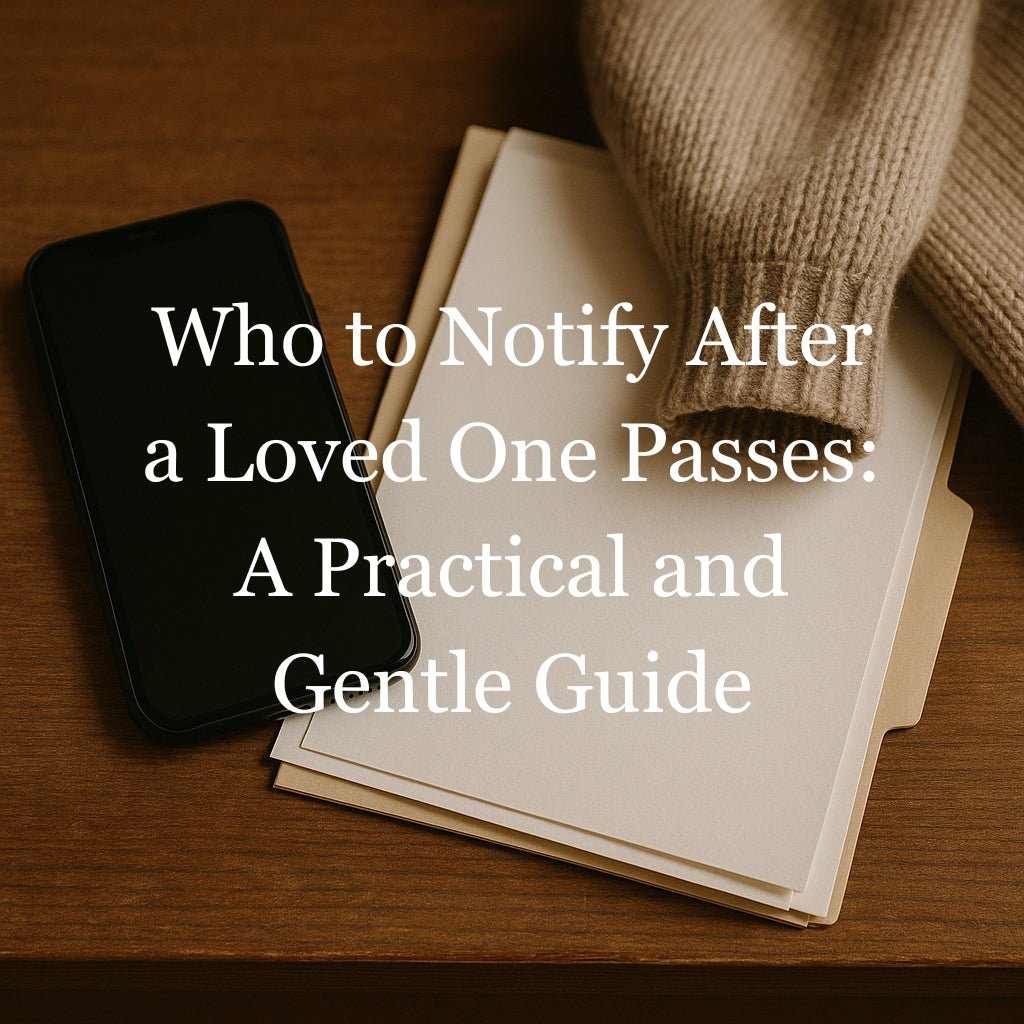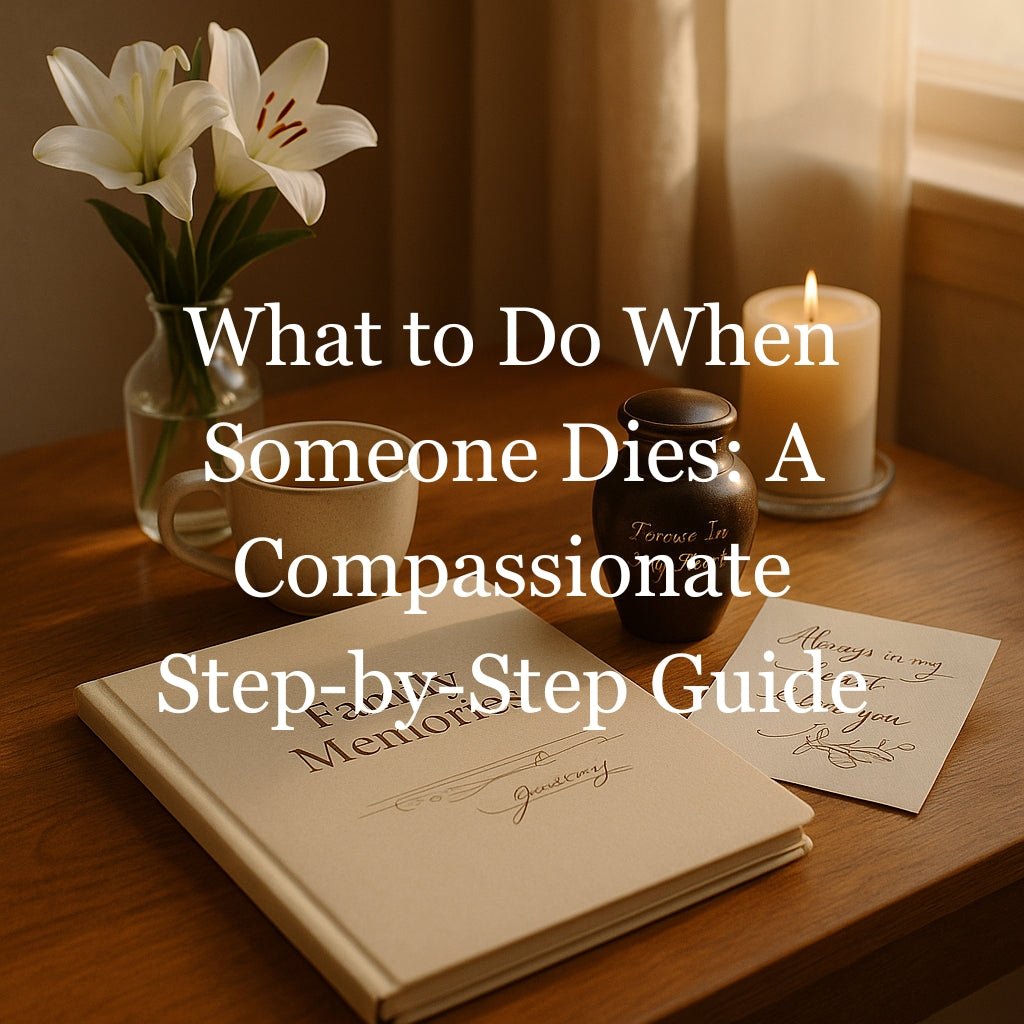Who to Notify After a Loved One Passes: A Practical and Gentle Guide
When someone you love dies, the last thing you want to deal with is admin. And yet, there is a long list of people and organisations that need to be informed. It can feel like a second wave of grief each time you say the words out loud.
This guide is written with care and clarity to help you understand who to notify and, just as importantly, what will happen after you do.
You do not need to do this all at once. Take your time. Focus on what is most urgent, and return to the rest when you feel ready.
1) Start with Government Departments: Tell Us Once
In the United Kingdom, the Tell Us Once service is offered when you register the death. The registrar will either complete it with you at your appointment or give you a unique reference number to do it online.
Tell Us Once contacts:
-
HM Revenue and Customs
-
The Department for Work and Pensions
-
The Driver and Vehicle Licensing Agency
-
The Passport Office
-
The local council (for council tax, Blue Badge, housing benefit and more)
What happens next
Once this is done, the departments involved will start processing changes. For example:
-
State pension payments and benefits will stop
-
Council tax bills may be updated or reduced
-
The driving licence and passport will be cancelled
This saves you from contacting each one individually and reduces the chance of unwanted mail later.
2) Notify Banks and Building Societies
You will need to contact every bank or financial institution your loved one had an account with. This includes savings accounts, current accounts, ISAs, and joint accounts.
Most banks have bereavement teams with trained staff who understand how difficult this time is.
What you will need
-
A death certificate (a copy is usually acceptable)
-
Proof of your identity
-
Details about your loved one’s accounts
What happens next
-
Sole accounts will be frozen. No money can go in or out until the estate is dealt with
-
Joint accounts will usually remain active and become the sole property of the surviving account holder
-
Any debts such as overdrafts become part of the estate and must be paid from it
-
You are not personally responsible for the debt unless it was in your name too
If the account has very little in it, some banks have simplified processes for small estates. You may not need probate in these cases.
3) Notify Mortgage Providers and Loan Companies
If your loved one had a mortgage or any loans in their name, contact the lender as soon as you can.
What you will need
-
A death certificate
-
Your own ID
-
Details about the property or loan
What happens next
-
The lender will freeze the mortgage account and explain what options are available
-
If there is a surviving joint mortgage holder, the payments may continue as usual
-
If your loved one was the only name on the mortgage, the debt must be settled through the estate or by selling the property
Important to know
Debts are not inherited. They must be paid from any money or property left behind. If there is not enough in the estate to cover them, the debts are usually written off.
4) Contact Pension Providers
If your loved one received a state or private pension, you will need to let those providers know.
What happens next
-
State pension payments will stop automatically if you use Tell Us Once
-
Some pensions include a lump sum or ongoing payments to a spouse or civil partner. These are known as death in service or widow’s pensions
-
The provider will explain what you are entitled to and how to claim it
4) Let Insurance Providers Know
Your loved one may have had life insurance, home insurance, car insurance, travel insurance or pet insurance.
What happens next
-
Car and home policies in their name will be cancelled or transferred to the new owner
-
If they had life insurance, the insurer will begin the claims process once they receive the death certificate and policy details
-
If there are ongoing payments due, these will usually stop immediately
-
You may be entitled to a payout if you are a named beneficiary
5) Cancel Utilities and Household Services
Contact all companies linked to their home, such as:
-
Gas
-
Electricity
-
Water
-
Council tax
-
Broadband
-
Mobile phone
-
TV licence
-
Streaming services
What happens next
-
Services can be transferred into your name if you are still living there
-
If no one is living in the property, services can usually be placed on hold or disconnected
-
Council tax may be reduced or stopped if the property is now empty
6) Notify the Landlord or Housing Association
If your loved one rented their home, speak to the landlord or housing provider as soon as possible.
What happens next
-
Rent is still due until the tenancy is officially ended
-
If the tenancy was joint, the surviving tenant usually continues the agreement
-
Some housing associations offer support or help with moving
7) Let Their Employer Know
If your loved one was still working, their employer will need to be informed.
What happens next
-
Final pay will be calculated including holiday pay and any owed salary
-
Pension contributions may be transferred or claimed
-
Some workplaces offer death in service benefits which can provide financial support to loved ones
-
Colleagues may be informed with your permission
8) Notify the DVLA and Cancel Car Insurance
Use the Tell Us Once service to contact the DVLA or contact them directly.
What happens next
-
The driving licence will be cancelled
-
If the vehicle is being kept or sold, the ownership documents (V5C log book) will need to be updated
-
You must inform the car insurer and arrange new cover before anyone else drives the car
9) Redirect Their Post
If they lived alone, you may want to set up a Royal Mail redirection service.
What happens next
-
Post will be sent to your address
-
This helps protect personal information and ensures you receive important letters like bank statements or tax forms
10) Cancel Online Accounts and Subscriptions
Go through their emails and bank statements to identify:
-
Social media accounts
-
Email accounts
-
Online shopping accounts
-
Music and video subscriptions
-
Magazine subscriptions
-
Charity donations
What happens next
-
Some platforms like Facebook offer memorialisation options
-
Others allow you to request account deletion by providing the death certificate and proof of your relationship
11) Do Not Forget Their Online Communities
A lot of people have close friends online. They might have played games together every night, talked on Discord, Twitch, or YouTube, or connected through Xbox, PlayStation or PC communities. These friendships were real and often made up a big part of your loved one’s everyday life.
It is easy to overlook these online spaces, especially when everything else feels so heavy. But if you know they had online friends or a regular group they played with, you might want to let them know what has happened.
You could log into their account and leave a simple message. Or you might add a short line to their profile, like “This account is no longer active. They passed away recently and are deeply loved and missed.”
This one small note can help those friends understand why their friend has gone quiet. It gives them a chance to grieve too. Sometimes they will even share stories or moments you never knew about, offering a new and lovely way to remember them.
A Gentle Note
This list is long, and it can feel exhausting when your heart is already carrying so much. There is no right way to do this. Just go at your own pace and remember, you do not have to do everything in one day.
When the time feels right, some people find comfort in creating something that helps them feel close to the person they have lost. That could be something small, like a piece of their clothing, a handwritten note they once gave you, or even a fingerprint keepsake. It is not about fixing the pain. It is simply about keeping a part of them with you, in a way that brings comfort during quiet moments.
And if you ever feel ready to share their story, our Hall of Memories is a space where their life can be honoured, remembered, and spoken about with love. We would love to read your story.






Leave a comment